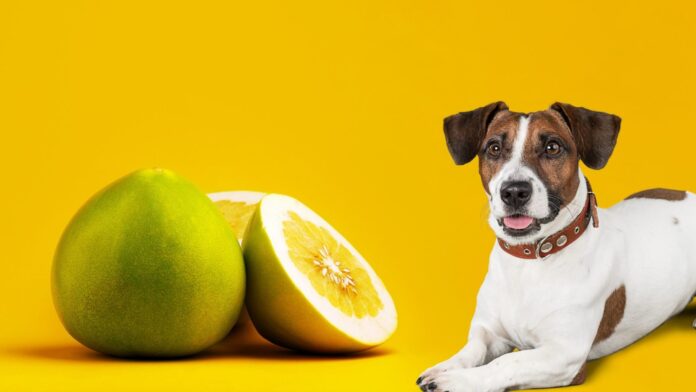Hey there, fellow dog parents! Ever found yourself snacking on a juicy pomelo and wondered if your four-legged bestie could have a taste? Well, you’re not alone! Today, I’m gonna break down everything you need to know about dogs and pomelos – the good, the bad, and the potentially messy!
The Quick Answer
TL;DR While the flesh of pomelo isn’t toxic to dogs it’s not the best treat choice. The rind and pith are definite no-nos that could cause some serious tummy troubles!
Breaking Down the Pomelo Parts
Let’s get real about what parts of this giant citrus fruit your pup should and shouldn’t eat
1. The Flesh (The Juicy Part)
- ✅ Not toxic
- High in citric acid
- May cause digestive upset
- Best given in very small amounts, if at all
2. The Rind (The Outer Skin)
- ❌ Absolutely not safe
- ⚠️ Contains essential oils
- Can cause severe digestive issues
- Might require vet attention if consumed
3. The Pith (White Spongy Part)
- ❌ Big no-no
- Hard to digest
- Can cause blockages
- ⚠️ Contains harmful compounds
Why You Might Wanna Think Twice
Look, I get it – sharing is caring! But here’s why pomelo might not be your best choice for treating your furry friend:
- Digestive Drama
- Can cause diarrhea
- Might lead to vomiting
- Possible stomach upset
- Could trigger acid reflux
- Citrus Concerns
- High acidity levels
- Natural sugar content
- Essential oils (especially in peel)
- Potential allergic reactions
- Better AlternativesInstead of pomelo, try these safer fruits:
- Apple slices (no seeds!)
- Watermelon (seedless)
- Blueberries
- Banana chunks
What to Do If Your Dog Ate Pomelo
Uh-oh! Did your sneaky pup grab some pomelo when you weren’t looking? Don’t panic! Here’s what to do:
If They Ate the Flesh:
- Monitor their behavior
- Watch for signs of upset tummy
- Provide fresh water
- Contact vet if symptoms appear
If They Ate the Rind:
- Call your vet immediately
- Watch for signs of distress
- Note how much they ate
- Follow vet’s instructions
Signs of Trouble to Watch For
Keep your eyes peeled for these symptoms:- Vomiting- Diarrhea- Lethargy- Loss of appetite- Excessive drooling- Abdominal pain- Unusual behavior
The Science-y Stuff
Okay let’s get a bit technical (but not too much!) about why pomelos can be problematic
Essential Oils
The rind contains concentrated oils that can be toxic to dogs. These oils can cause:- Gastrointestinal irritation- Nervous system issues- Liver problems in severe cases
Citric Acid
While not toxic, high amounts can lead to:- Upset stomach- Acid reflux- Dental issues- Digestive problems
Safe Fruit-Feeding Tips for Dog Parents
If you’re determined to share fruits with your pup, here’s how to do it right:
- Always Start Small
- Tiny portions first
- Watch for reactions
- Increase slowly if no issues
- Proper Preparation
- Remove all seeds
- Take off any peels
- Cut into manageable pieces
- Clean thoroughly
- Timing Matters
- Not before exercise
- Not with regular meals
- Not before bedtime
- Small amounts as occasional treats
FAQs About Dogs and Pomelo
Q: Can puppies eat pomelo?A: Nope! Puppies have even more sensitive tummies than adult dogs.
Q: What if my dog only licked the pomelo juice?A: Probably fine, but watch for any upset tummy signs.
Q: How much pomelo flesh is too much?A: Even a small piece can be too much for some dogs – better safe than sorry!
The Bottom Line
While pomelos aren’t technically toxic (well, the flesh at least), they’re not really the best choice for your furry friend. There are so many better, safer fruits you could share instead! If you’re dead set on giving your dog some pomelo, keep it to tiny amounts of flesh only, and always watch for any bad reactions.
Remember, every dog is different – what’s fine for one might not be great for another. When in doubt, always check with your vet first!
Pro Tips for Dog Parents
- Keep fruit treats to 10% or less of daily diet
- Always introduce new foods slowly
- Have your vet’s number handy
- Know your dog’s normal behavior
- Keep a pet first aid kit ready
Stay safe and snack smart, fur parents! And maybe keep that pomelo all to yourself – your pup won’t mind, promise!
Disclaimer: This article is for informational purposes only. Always consult with your veterinarian before introducing new foods to your dog’s diet.












